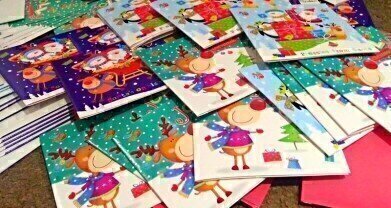Business News
Should We Stop Sending Christmas Cards?
Dec 19 2019
Christmas cards represent an annual opportunity for family and friends to connect with each other and perhaps give a recap of the last 12 months, while wishing good cheer for the coming year. They’re an especially popular tradition in the UK, where 1.5 billion cards are bought annually, creating an industry that’s worth approximately £1.3 billion.
However, many people do not consider the environmental impact of all of these cards. Since a third of paper is not recycled in the UK, much of those cards end up in landfill where they can take years to decompose. Meanwhile, the emissions produced in the manufacturing and delivery processes are no insignificant factor, either. For those reasons, some concerned environmentalists are calling for an end to this festive but polluting pastime.
The unseen effect
The environmental footprint of a card derives from four distinct stages of its life cycle. These are comprised of:
- Paper production. Producing the paper needed to create the cards not only contributes to deforestation, which is one of our biggest environmental problems, but also many emissions in the process required to turn that wood into paper.
- Printing. The ink used to print images and words onto the card also incur some environmental consequences, although this is the smallest contributor to its overall footprint.
- Postage. The emissions created by planes, trucks and delivery cars to send the cards to stores in the first place, and then from the sender to the recipient in the second place, are generally regarded as being responsible for the largest part of the card’s footprint.
- Decomposition. The 33% of cards which are not recycled end up in landfill, where they degrade anaerobically and release greenhouse gases (GHG) into the atmosphere, upsetting EU targets with regard to GHG emissions and contributing to global warming.
Together, these four stages mean that sending just one card is the equivalent of releasing 140g of carbon dioxide (CO2) into the atmosphere. Extrapolated over the entire UK Christmas gift card industry, that’s equivalent to over 210,000 tonnes of CO2.
One school takes a stand
Cognisant of those harmful impacts, one primary school in Lincolnshire has taken the controversial step of banning Christmas cards in classrooms this year. Normally, each pupil sends cards to all of their classmates, but Belton Lane Primary headteacher Jonathan Mason has written to parents asking them to just make one card for the whole class.
“Throughout the world we send enough Christmas cards that if we placed them alongside each other, they'd cover the world's circumference 500 times,” he explained. “The manufacture of Christmas cards is contributing to our ever-growing carbon emissions. So in order to be environmentally-friendly in school we will not be having a post box for Christmas cards from this year onwards.”
The decision has been met with resistance by some parents, who believe it is not in keeping with the seasonal spirit and that the impact of Christmas cards in comparison to other forms of pollution is negligible. That may be true (especially when the cards are recycled), but every little helps in cleaning up our collective act and reducing our carbon footprint.
Digital Edition
AET 28.3 September 2024
September 2024
Business News - ENVEA announces acquisition of APAQ Group - SICK and Endress+Hauser sign strategic partnership - Efforts to curb gas flaring intensify amid environmental concerns Air Monito...
View all digital editions
Events
WEATHER • CLIMATE • WATER / EARTH OBSERVATIONS / GREEN ECONOMY
Oct 29 2024 St. Petersburg, Russia
Oct 30 2024 Hong Kong
Nov 05 2024 Toronto, Canada
Nov 05 2024 Rimini, Italy
Nov 06 2024 Ho Chi Minh City, Vietnam



















